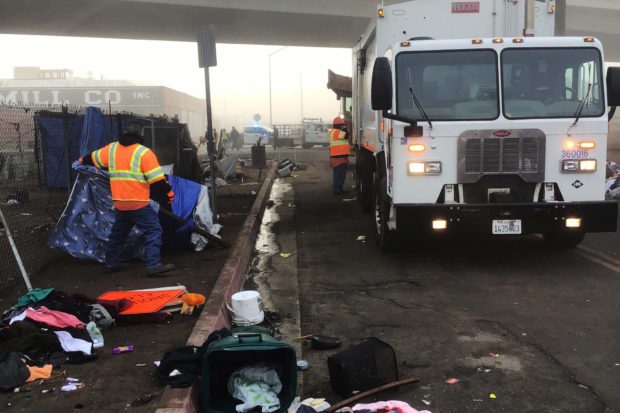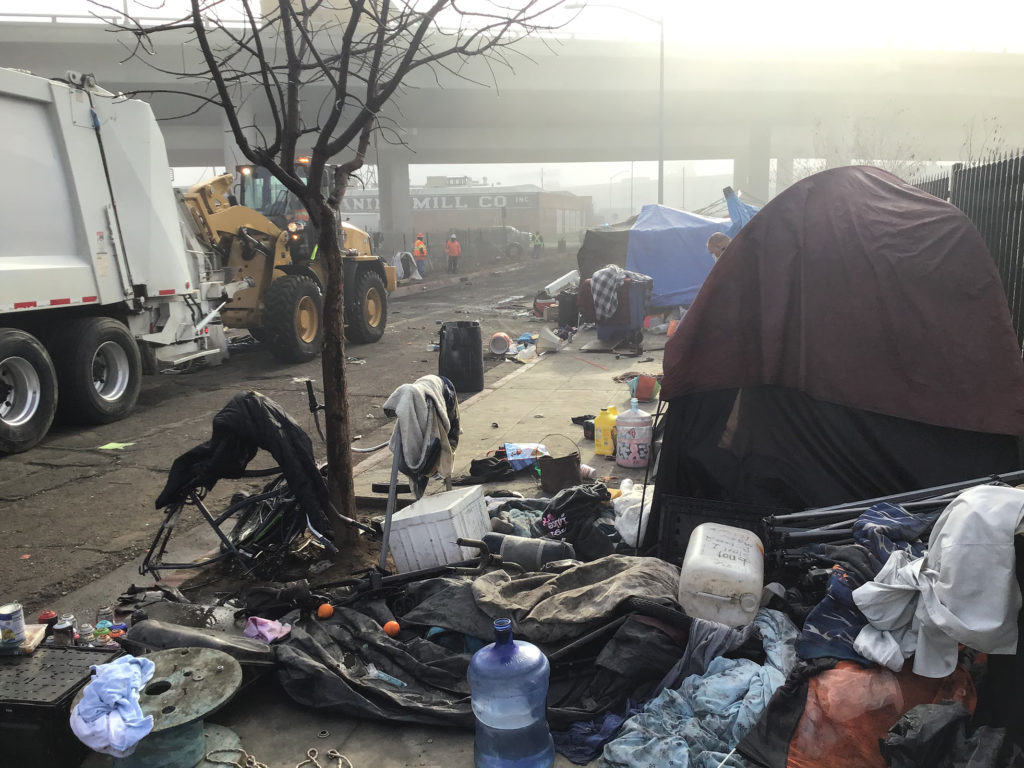

On Jan. 12, it was a truly dystopian scene at H and San Benito streets in downtown Fresno. Police car lights in the dense fog, the jaws of large heavy equipment scooping up property and debris in the cold atmosphere of the early morning hours, and the unhoused residents desperately packing up personal property.
There was a heavy police presence, with more than 50 other city workers roaming around, plus the so-called outreach team members from Poverello House. Collectively, they outnumbered the miserable encampment residents who scrambled to save any personal property they could from destruction in a short time.
The misleading notice that the city had posted earlier said:
That on Wednesday, January 12, 2022 at 7:30am, the City of Fresno will remove and destroy garbage that has accumulated in the areas of:
H Street between Ventura and Monterey Street
San Benito Street between H Street and Broadway St
Santa Clara St between H Street and Broadway
The City will not remove or destroy the personal property of any individuals. However, to avoid any confusion, please move any personal property you may have away from any garbage piles located in this area.
The city destroyed tents, tarps, mattresses and other personal property that people were unable to remove in time. Many homeless advocates witnessed this including Dez Martinez. Martinez and the author repeatedly asked the HART (Homeless Assistance Response Team) sergeant in charge and the assistant city attorney to save certain tents and other property from destruction. Those requests were denied.
Although these abatement raids are not permanently moving folks from encampments and they are allowed to return the same night, throughout the city encampments on private and public property are being razed. The city has vowed to offer people temporary housing before forcing them to move, however, over the past several months, the City has razed several encampments on private property and offered no shelter.
Always, a number of people move before the raid. If it is public property, those that stay might be offered temporary shelter, but that is not always the case.
The idea of forcing homeless people off one sidewalk only to send them on a search for another—if they turned down whatever offer of shelter was made—has never been a successful way to get them housed. And with the Omicron variant of the coronavirus raging through the county, setting new case records, it’s a bad idea from a public health perspective to move people. Some would say it’s crazy.
Although Fresno is apparently not tracking Covid cases among the homeless population, other cities are. For example, in the week of Dec. 27, there were 448 cases of Covid-19 among homeless people in Los Angeles County—the highest one-week total since last winter. And more than 140 shelters in the county had experienced an outbreak of Covid (with one or more cases).
Even assuming that there are shelters in Fresno currently with no outbreaks, there is no assurance that the situation won’t change in a matter of days with the new highly transmissible variant.
Ideally, a homeless person should be offered a room through Project Off-Ramp. But there aren’t enough rooms available, and other shelters are always full.
The Centers for Disease Control and Prevention stated in 2020 that if individual housing options are not available, homeless people should be allowed to remain where they are during a pandemic. Now that Omicron is accelerating, that advice should still hold particularly because of the low rate for full vaccination among homeless people in the county.
Much of the homeless population remains extremely vulnerable to any variant of the coronavirus. There are encampments with potential Covid outbreaks. It’s winter, and it’s cold. There is no perfect solution, and some homeless people often do not want to go to shelters for a variety of legitimate reasons even when the weather is bad and there is no pandemic.
Given all the factors involved, a homeless person should be allowed to choose to accept an offer of a group shelter or stay put—at least during this bad stage of the pandemic.
Unfortunately, these encampment raids and abatement actions further criminalize homelessness. It is unconstitutional, racially discriminatory, inhumane and bad public policy.
Sadly, our elected leaders continue to harm and punish the most vulnerable among us. On Jan. 13, the Fresno City Council was set to approve a new ordinance to further criminalize the unhoused.
The ordinance proposed to make it a crime to be in the vicinity of an “abatement area.” An unhoused individual, homeless advocates or anyone in the area could be arrested and fined. Fortunately, because several advocates spoke against this unconstitutional ordinance, it has been tabled for now.
Many believe the ordinance’s target is homeless advocates, because when abatement actions occur, advocates show up and document the City’s actions.
If we want to end homelessness, we first need to stop using these laws and ordinances to punish people who have been the victims of our bad housing policies and focus on fixing those policies to ensure the basic human right to housing for all. The 9th Circuit Court of Appeals found it unconstitutional to punish a person experiencing homelessness for sleeping outside, in the absence of adequate alternatives.
As no state meets that bar by providing adequate alternatives, the growing number of local ordinances and laws are likely to face intense judicial scrutiny. Although many of these laws regarding homelessness date back to Jim Crow–era Black codes, there is a concerning new trend of enacting new laws and ordinances.
Laws that criminalize homelessness do not solve the underlying causes of homelessness. Instead, criminalization exacerbates a person’s situation, often by creating additional barriers to housing and employment.
Criminalizing public sleeping in cities without sufficient housing and support for homeless individuals does not improve public safety outcomes or reduce the factors that contribute to homelessness. Fresno can redirect its efforts by identifying meaningful and constitutional solutions to the housing crisis.
There is a dearth of funding available. At a City Council workshop on Jan. 13, the City presented a report titled “Summary of 2021 Homeless Service Investments.” The report states that the Fresno community received $143.3 million in the past 30 months in state and federal funding for housing and services for the unhoused. The report states how some of this funding has been allocated by the city to date.
The author has submitted an information request to the county, the Fresno Housing Authority and the Fresno Madera Continuum of Care on the significant portion of the $143.3 million they received because they have not issued public reports as the City has.
In addition, the American Rescue Plan has provided the city with $173 million and the county with $192 million in funding that can be used for housing and services. There is more state and federal funding on the way.
Last year, the state approved $12 billion to create mostly homeless housing and board and care facilities. This money will be disbursed soon. This year, another $2 billion is being proposed by the governor, including $1.5 billion to buy and set up “tiny homes.”
With so many dollars available, it is unconscionable that the mayor and the City Council cannot offer more humane temporary solutions to this crisis until more permanent housing is built. People are dying on the sidewalks, alleys and streets of Fresno.
The attitude, or philosophy, of the mayor and the City Council is exemplified in the following example:
With temperatures below 40 degrees every night, the city has opened only one warming center, the Ted C. Wills Community Center, for the unhoused to sleep at night. This center will close on Jan. 24.
The city did no outreach to the unhoused community. Advocates made and distributed flyers in an attempt to let folks know. The city refuses to arrange for transportation to the center. Advocates are giving rides to some.
The author recently implored the mayor to consider opening more centers, keeping the centers open all winter, asking so-called outreach workers from Poverello House to do widespread publicity outreach and using Poverello vans to transport people to and from the centers. Poverello House receives large amounts of funding from the city to do “outreach.”
The mayor responded by saying that he would consider the requests, but as of this writing has not committed to anything.
The liberals on the City Council seem to be aligned with the mayor on continuing the razing of encampments, continuing the harassment policies and procedures of “trash abatement” and refusing to provide a warm place to sleep at night.
Sadly, an unhoused veteran was recently found dead on a cold Fresno sidewalk. More deaths from exposure and hypothermia are inevitable.
The situation on the streets of Fresno brings to mind a song by the punk rock band the Dead Kennedys titled “Kill the Poor.” One line of the song is “the liberals say that it’s okay so kill, kill, kill the poor tonight.”
Are you outraged? Contact the mayor and City Council members today.
*****
Another Tragedy on Jan. 20
By Dez Martinez
On the cold evening of Jan. 20 in Fresno, an unhoused elderly man was found deceased on the sidewalk of a busy street. Ventura and Fifth Street is where he took his last breath of life while laying on the cold concrete with a blanket by his side.
From our understanding, he was deceased all day. This means hundreds of cars and people passed by this elderly man. It wasn’t until the evening when someone called about a homeless man on the sidewalk.
How many more preventable deaths will we have on our streets? Our mayor gloats about what he has done but ignores the passing of so many unhoused trying to survive the brutal life of the streets of Fresno.
This was by a bus stop also. So how many buses passed him? How many people sat at that bus stop that day and didn’t bother to check on him? It’s getting to be the norm to see so many bodies lying on our streets; no one ever checks on people anymore.
A simple stop and “hello, are you ok?” takes three minutes of your time.
Please consider Stop, Check and Ask. This should be mandatory for all outreach teams.
Stop driving by.
Check if they are ok.
Ask if they need anything.
It’s simple: Stop, Check, Ask!
*****
Dez Martinez is an advocate for the homeless. She founded Homeless in Fresno, an advocacy group, while unhoused on Fresno streets and We Are Not Invisible, a non profit organization after being housed, wanif.org
